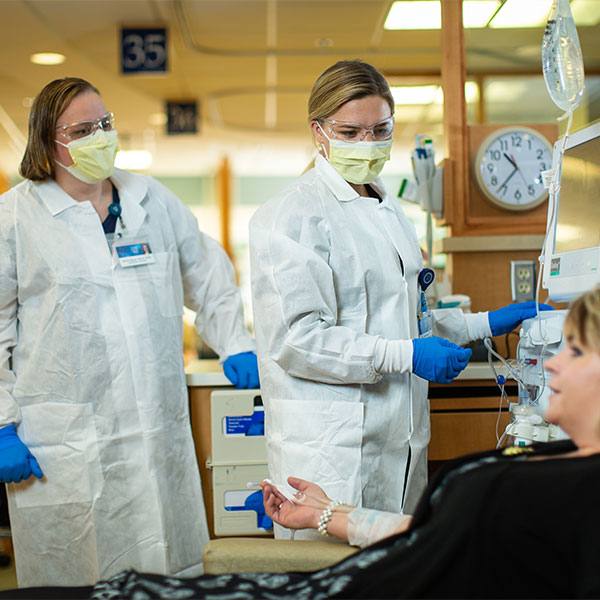-
Triggering the body’s ability to heal
Erwin Kruger, M.D., is motivated by challenges that evolve into enhanced clinical care. He chose the rigors of college, medical school and fellowships in the U.S. rather than an easier road to medical school straight out of high school in his native country of Nicaragua. His career path since then has been a circuitous journey through academia, research, private practice and now to Mayo Clinic in Arizona where he is advancing regenerative options in reconstructive plastic surgery, hand surgery and advanced wound care.
"I believe in innovation in health care and in bringing new technologies to patients. I think regenerative medicine and regenerative surgery are ways to do that. This evolving area of practice, with its focus on restoring health, is a new concept that changes how we think about solving complex medical conditions in the modern era," says Dr. Kruger.
Embracing innovative therapies, Dr. Kruger is leading an advanced wound care clinic at Mayo Clinic in Arizona for patients with chronic, troublesome ulcers that don't heal with standard treatments. Mayo Clinic's Center for Regenerative Medicine supports this work to provide transformative regenerative care to address unmet patient needs.
"When I was first thinking about medicine, I was introduced to the concept of angiogenesis — the growth of new blood vessels — as a common denominator for regenerating health. I'm fascinated with advanced research into ways to unleash the body's ability to regenerate blood vessels that safely enhance healing for patients with difficult wounds," says Dr. Kruger. "My practice and research in plastic surgery and wound reconstruction are logical extensions of this background."
Whether it is from diabetes, injury or effects of radiation, chronic, nonhealing wounds afflict millions of people in the U.S. Finding solutions has turned into a multibillion-dollar industry.

Whether it is from diabetes, injury or effects of radiation, chronic, nonhealing wounds afflict millions of people in the U.S. Finding solutions has turned into a multibillion-dollar industry.
Leading a Medicare study
Dr. Kruger is leading a Medicare claims study to investigate a new regenerative product for difficult-to-heal wounds. It's a patch that taps the body's natural mechanisms and the patient’s living cells. The patch is created by the patient’s own blood using a centrifugation system that separates, coagulates and compacts the blood components into a platelet-rich fibrin patch with no additives. The patient’s immune cells, platelets and growth factors help trigger the wound healing response. This is a new regenerative treatment for people who have run out of therapeutic options.
"The patch is created by processing the patient's own blood. Unlike other healing products, it doesn’t rely on foreign substances or scaffolding," says Dr. Kruger. "One of my interests is to provide patients with advanced options that might include human-derived products, skin substitutes and advanced dressings to heal troublesome wounds. It is critical to understand which products, potentially in sequence or in combination, will lead to stable healing of a chronic wound."
The Centers for Medicare and Medicaid Services (CMS) has approved the use of this patch for patients with diabetes and ulcers that have failed to heal with standard therapies. Before the patch can be extended to patients in clinical care, the government must establish a structure for reimbursing health care providers for the service. Dr. Kruger's study is compiling data as part of a CMS development program to determine the proper billing codes.
Seeking regenerative solutions for surgery
Dr. Kruger emigrated to the U.S. to complete his undergraduate degree at Harvard University. After taking time off for research at the National Institutes of Health, he attended medical school at the University of Chicago then furthered his training in plastic and general surgery at UCLA. His education includes a residency in plastic surgery at UCLA, a fellowship in wound healing and a hand and microsurgery fellowship at the University of Pennsylvania. Dr. Kruger became a naturalized U.S. citizen in 2010.
Mayo Clinic's emphasis on research, practice, and education attracted Dr. Kruger to Mayo in 2019. He is eager to apply that three-shield approach to reconstructive hand surgery, another complex area of medical practice.
"Hand surgery is a field that is very meticulous and requires a steep learning curve over the course of a career. The anatomy of the hand is always inspiring. The scope and diversity of hand surgery is broad, ranging from infections to fractures, degenerative conditions and complex reconstruction," says Dr. Kruger. "I am interested in research that could reveal new regenerative options for both plastic surgery and hand surgery."

"The anatomy of the hand is always inspiring. I am interested in research that could reveal new regenerative options for both plastic surgery and hand surgery."
Dr. Kruger is collaborating with David Lott, M.D., and Vincent Pizziconi, M.D., of Arizona State University, on a research initiative to advance biodegradable technologies for regenerative surgeries. The idea is to use 3D printing models of biodegradable composites, which the research team has termed "bioware," instead of traditional metal hardware to reconstruct facial or hand fractures.
"We are intrigued with exploring the possibility of whether bioware could eventually become a viable option to stimulate or enhance healing of a patient’s bony injury and whether it could eventually biodegrade and become a part of the patient's bone," says Dr. Kruger. "If so, it could eliminate the need for further surgeries to remove surgical hardware that is causing complications. This concept brings together many Mayo-ASU collaborators but is still in the early idea phase."
Additional study needed
Dr. Kruger envisions the Medicare claims study will be completed by the end of 2022. It may take up to a year for Medicare to review and approve the use of natural wound healing patch for Medicare patients and others who are not yet on Medicare.
###








